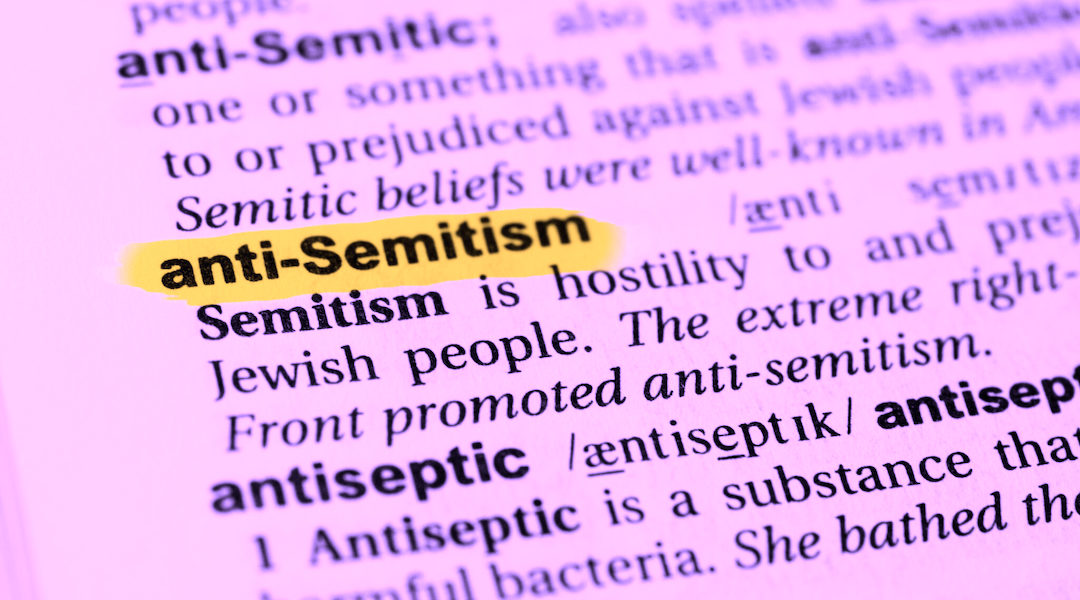Nearly half of Americans see antisemitism as a ‘very serious problem,’ poll finds

(Getty Images)
(JTA) — Close to half of all Americans view antisemitism as a “very serious problem,” according to a Gallup poll, more than five times the proportion of respondents who said so the last time the polling firm asked the same question more than two decades ago.
And in a separate Gallup poll, 11% of American Jewish adults said they were frequently “treated poorly or harassed” due to their religion. An additional 25% said such treatment happened occasionally. A majority of American Jews, 60%, said they feel uncomfortable sharing their religious affiliation, far more than the 25% of Americans over all who said the same.
In the antisemitism poll, respondents were asked the same question they were in 2003: “Do you think that antisemitism, or prejudice against Jewish people, is currently — a very serious problem, somewhat of a problem, not much of a problem or not a problem at all — in the United States?”
The latest Gallup poll, released Monday, found that 49% of respondents say that it is a very serious problem, while 32% say it is somewhat of a problem — meaning a total of 81% who believe it is a problem. Ten percent say it is not much of a problem while 8% say it isn’t a problem at all.
This year’s poll of 1,o24 people, conducted by phone in May, comes in the wake of widespread reports by law enforcement and communal watchdogs of a sharp spike in antisemitism after the Oct. 7 Hamas invasion of Israel, which sparked the current war. Additionally, at least five deadly attacks spurred by an theory about immigration with antisemitic roots occurred during the Trump administration., including two synagogue shootings. The poll had a margin of error of 4 percentage points.
Those numbers align in part with a poll of Americans taken in February by the Pew Research Center. That poll found that 82% of Americans said there was either a lot or some discrimination against Jews in society, though only 40% said there was a lot of discrimination.
In 2003, the last time Gallup asked the question, 9% said they believed antisemitism was a serious problem while 48% said it was somewhat of a problem, a total of 57%. At the time, a total of 39% believed it wasn’t or wasn’t much of a problem. Gallup had asked the question in 2003, the firm said, to measure sentiment as Sen. Joe Lieberman mounted an ultimately unsuccessful presidential campaign.
For the first time, Gallup also asked the same question about discrimination against Muslims, and Americans seemed somewhat less concerned about Islamophobia. One third of Americans say that prejudice against Muslims is a serious problem, according to the poll, while another 41% see it as somewhat of a problem, for a total of 74% seeing it as a problem.
Separate polling by Gallup also confirmed recent polling by the AJC and others of increased insecurity among American Jews. The firm asked, “How often in the past year were you treated poorly or harassed because of your religion?”
The more than one-in-10 Jews who said they had faced frequent harassment was more than any other religious group asked, though Gallup said its survey sample did not include enough Muslim respondents to report their responses. It did not give a sample size or margin of error for the sample of Jewish respondents it asked.
Among Americans overall, the survey found that 2% said they were frequently harassed and 8% said they were occasionally harassed. Asked whether harassment and poor treatment had increased over the last year, 46% of Jews said it had, as opposed to 10% of Americans overall.
A message from our CEO & publisher Rachel Fishman Feddersen
I hope you appreciated this article. Before you move on, I wanted to ask you to support the Forward’s award-winning journalism during our High Holiday Monthly Donor Drive.
If you’ve turned to the Forward in the past 12 months to better understand the world around you, we hope you will support us with a gift now. Your support has a direct impact, giving us the resources we need to report from Israel and around the U.S., across college campuses, and wherever there is news of importance to American Jews.
Make a monthly or one-time gift and support Jewish journalism throughout 5785. The first six months of your monthly gift will be matched for twice the investment in independent Jewish journalism.
— Rachel Fishman Feddersen, Publisher and CEO